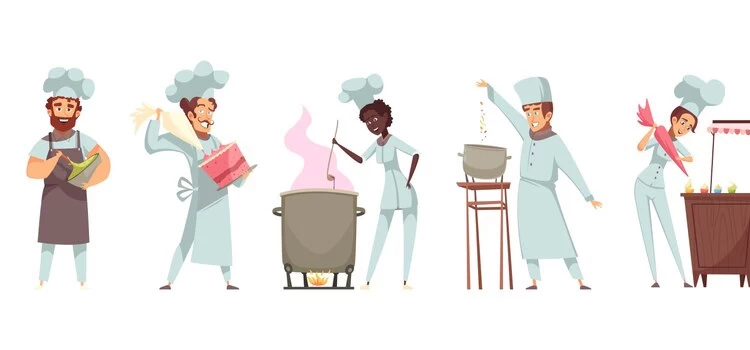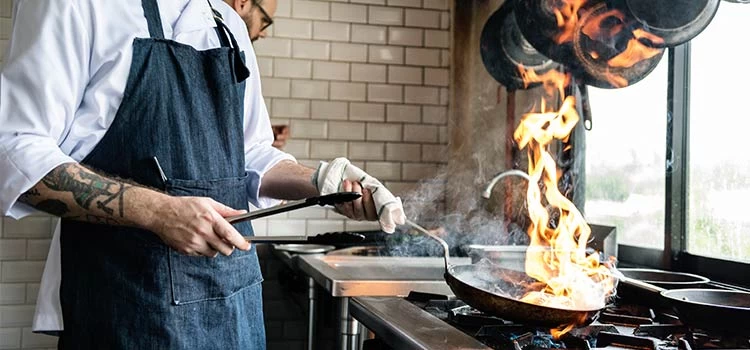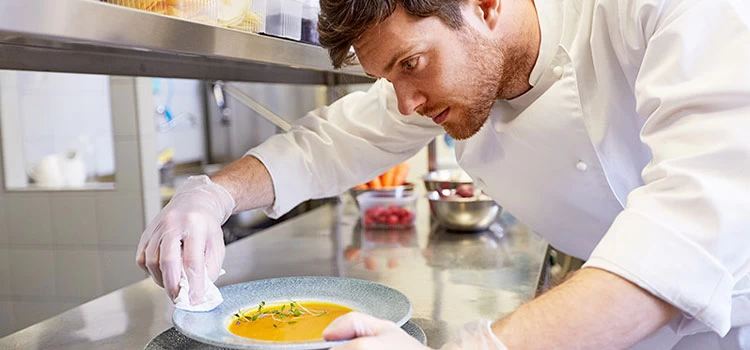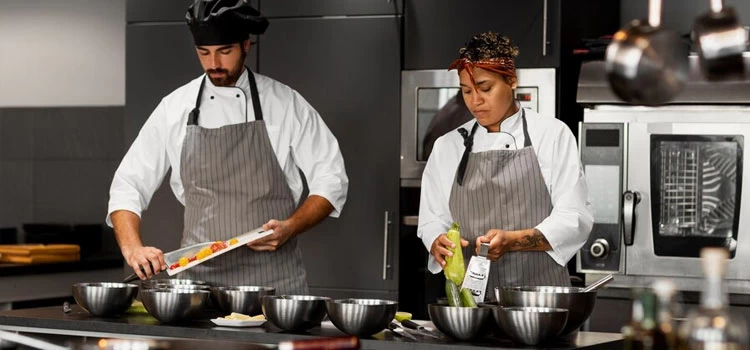Food Hygiene & Safety
How to Become a Chef in the UK and Worldwide – Difference Include
If you are a foodie with a passion for cooking, you might consider being a chef. To be a chef can be an exciting career for someone who has the endeavour and dedication in the food venture.
Further, as a chef, you would be dealing with recipes, flavours, textures, and cooking techniques. It would help if you were innovative to bring fresh dishes from your kitchen to the table of food lovers. That is why this job requires years of hard work and willingness to learn and prosper in this field.
To help you in this journey of becoming a chef, we have come up with all the relevant information you need to know to follow your passion. Read the blog thoroughly to learn about how to become a chef.
Table of Content
- Who is a Chef?
- What is the Difference between a Cook and a Chef?
- What are the Different Ranks of Chefs?
- What are the Duties of a Chef?
- The Necessary Skills Required to be a Chef
- How to Gain Essential Work Experience as a Chef?
- Who are the Employers?
- What are the Typical Working Hours of a Chef?
- How to Become a Chef?
- How Long Does it Take to Become a Chef?
- How Much do Chefs Earn?
- Career Prospects
- Conclusion
- What to Read Next:
Who is a Chef?
A chef is someone who not only cooks but is also responsible for creating recipes, ordering ingredients, planning and pricing the menu, managing costs, overseeing food preparation and receiving customers’ feedback. So besides cooking, they have to carry out responsibilities within and outside the kitchen.
What is the Difference between a Cook and a Chef?
Both the chef and the cook are responsible for preparing food in the kitchen. However, there remain some differences between them. Have a look at the table below-
|
Cook |
Chef |
|
Anyone who enjoys preparing food can be called a cook; no formal training is required to be a cook. |
A Chef undergoes specialised courses and training to learn various cooking skills and become a chef. |
| Prepares food following the established recipe. | Creates his own recipe and prepares food accordingly. |
| Perform kitchen duties as needed and directed. | Directs, appoints and supervises the duties of others in the team. |
| Works in hospitals and academic settings like schools, colleges and universities. |
Works in chain or hotel restaurants, cruise ships and bars. |
 Are you looking for a chef course to become a successful chef
Are you looking for a chef course to become a successful chef
What are the Different Ranks of Chefs?
In every kitchen, there are different ranks of chefs who remain responsible for running the kitchen smoothly in order to deliver food orders within time. Each one of them performs their job roles according to their hierarchical position. The following gives an insight into the various ranks of chefs and the duties they have.
Executive Chef
Large chains or restaurants usually appoint an executive chef. They do very little cooking. Their primary role is to manage the kitchen and its staff. This includes observing and training personnel, planning menus, managing the culinary budget and sometimes purchasing. To be an executive chef, you need prior experience in cooking and good management skills to ensure that the kitchen runs efficiently.
Head Chef (Chef de Cuisine)
The head chef remains at the top of the hierarchy in restaurant kitchens and is responsible for controlling all the aspects of the kitchen. They create menus, control kitchen costs, and manage the kitchen staff. Some head chefs leave the cooking to the deputy chef and the rest of the team, while others prefer to be involved in the day-to-day cooking activities.
Deputy Chef (Sous Chef)
The deputy chef, also known as the sous chef, remains second-in-command in the kitchen. Depending on the restaurant and management, there can be more than one deputy chef. The deputy chef’s role may overlap with the head chef’s. However, the deputy chef is in charge of the kitchen and oversees the day-to-day activities.
Station Chef (Chef de Partie)
The station chefs play critical roles in the kitchen. They cook the food that is being served to customers. Each station chef is responsible for a different food category. For example, one can be in charge of cooking the fish and the other can cooks the meat.
Commis Chef
A commis chef is a junior chef who learns from a more experienced chef, such as a chef de partie. A junior chef is the ideal starting point if you want a senior role in a restaurant kitchen. They measure ingredients, prepare meat and vegetables, assist other chefs, clean the station and help with deliveries.
What are the Duties of a Chef?
Working as a chef can be a varied and dynamic role with various responsibilities. Some of them are-
- Preparing Menus- They are responsible for naming the items listed in the menu, analysing the performance of each item or dish, and reviewing the dishes as a part of the whole menu.
- Inventory Management- They are the key to deciding which ingredients are to be ordered from the suppliers. In this way, he also participates in budgeting and keeping records to present before the restaurant administration.
- Monitoring Safety Standards- They need to strictly follow the kitchen safety standards and monitor that their subordinates maintain them too. He also looks after the kitchen equipment’s functionality to avoid unwanted incidents.
- Quality Control- They inspect the freshness of the ingredients and ensure that the food they provide is of the best quality. He also monitors the cleanliness of the kitchen.
- Recruiting Chefs- One of the senior chefs’ responsibilities is to participate in the recruitment process to select the eligible candidate to include in their team.
- Train the Kitchen Staff- The senior chefs are also responsible for training the other kitchen staff and ensuring their duties are carried out to their fullest potential.
- Developing New Recipes- Experimenting and developing new ideas to introduce new dishes is the most important duty of any chef.
- Receiving Feedback from the Guests- They are also known to interact with the guests to receive their feedback on food quality, service and presentation. He modifies and develops those areas that require more attention along with his team members.
The Necessary Skills Required to be a Chef
Being a chef is not only about your cooking skills; it demands a combination of your culinary skills and soft skills. Have a look at some of the essential skills that a chef should have.
A genuine passion for food
As a chef, you must have the endeavour to make other people’s dining experiences memorable. You should love experimenting and being creative with food. Enthusiastic chefs develop innovative ways of preparing delicious and visually presentable dishes.
Adaptability
Being adaptable and flexible is necessary to meet the culinary needs of your customers and use them to adapt and reinvent yourself. Customers these days stay updated and are influenced by new trends and culinary techniques. That is why you need to improve and adapt to the latest food-making styles continuously.
Time management skills
Chefs should master time management skills since they need to juggle all the kitchen needs, such as keeping up with busy schedules, purchasing supplies, storage, and meeting the needs of stakeholders.
Organising skill
The workload of a chef varies throughout the day, so they must be organised and prepared for that. With the progress of your career, your organisational skills will ensure staff management effectively and help you control every aspect of the kitchen.
Creativity
A chef is expected to be creative with his ideas of pairing ingredients and preparing a new dish to provide the best culinary experience to the customers. Besides cooking, they also require creativity with decor, tableware and seating arrangements in the restaurant.
Accuracy
As a chef, you should consider the percentages of ingredients, the appropriate temperatures, preparation times and the safety and hygiene steps to maintain accuracy.
Ability to work in a team
There are usually a lot of people from different backgrounds in a professional kitchen. That is why working and getting on well with the team members is essential for a smooth cheffing career.
Leadership skills
Along with being a team player, experienced chefs should know how to lead the team and get the best out of them. The Head Chefs usually give direction and have it followed immediately. They also need to mentor and coach junior staff members during cooking.
Along with these essential skills you should possess an extensive understanding of food safety management systems and also should know about high risk food, if you wish to become a chef.
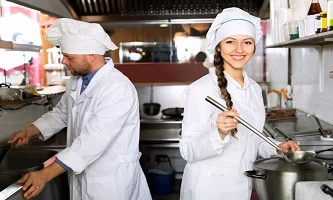
Kitchen Assistant – Catering
- Accredited Courses
- Tutor Support Included
- 3 Installment Plan at checkout
- 14 Days Money Back Guarantee
How to Gain Essential Work Experience as a Chef?
If you aspire to be a chef, you need to get some experience to increase your chances of getting your first job. However, gaining work experience as a chef can be difficult if you do not know anyone in the industry. Here are some suggestions of places where you can contact for the voluntary experience.
Restaurants
The most obvious place to gain experience as a chef is at the restaurants. You can contact a restaurant kitchen and ask if you can volunteer. Restaurant kitchens appreciate additional help preparing ingredients and assisting other team members.
Try sending volunteer enquiries to restaurants that you admire and have visited before. It will make them feel that you are genuinely interested in working in their restaurant.
Hotels
Working in a hotel kitchen might give you the chance to work with experienced chefs. Some hotels only serve breakfast, while others have restaurants that cater for breakfast, lunch and dinner. You can look for such hotels and get the practical experience of working in a professional kitchen.
Bakeries
Though most bakeries only hire pastry chefs, they can offer excellent work experience for aspiring chefs. Here, by working in a bakery, you can observe how pastries, desserts, cakes and many other baked goods are made.
In addition, just like a restaurant chef, chefs in a bakery have to follow strict recipes and they need to have exceptional presentation skills. Further, Volunteering at a bakery will let you learn how to follow the recipes and the importance of food presentation.
Working in a bakery will give you an excellent kickstart on your career path if you decide to be a specialised chef and want to become a pastry chef.
Working as a Kitchen Porter
This entry-level job will expose you to the reality of kitchen life. Chiefly, a kitchen porter is the pot washer and many great chefs have started out from here. Further, if you work as a kitchen porter, you will experience the pressure of a busy shift, the fast pace of the kitchen, and the thrill of working with a team.
Kitchen porters are in direct contact with the chefs themselves, so you can take this opportunity to observe and ask questions. Try picking up lots of tips, observe basic food prep, show your interest to help them and you can develop the foundations of the trade.
Since you wouldn’t need any experience to apply, you can start working as a kitchen porter at a young age, even as a teenager.
Working as a Waitperson
If you are struggling to get work experience as a chef, you can start working as a waiter since finding a chef job isn’t always easy. Waiters work between the kitchen and the restaurant. In some restaurants, the waiters are also responsible for preparing desserts and assisting with other dishes.
As a waiter, you can observe how the chefs work and get insight into how the kitchen works and runs. If you develop a good relationship at work, you can apply when a new kitchen vacancy becomes available.
Apprenticeships
Many chefs prefer to start as apprentices rather than going straight to culinary school. Primarily doing this offers practical experience, networking opportunities and a chance to see what it is like working as a chef.
Who are the Employers?
You can find job opportunities as a chef in places like-
- Chain restaurants
- Hotel Restaurants
- Bar Restaurants
- Pubs
- Cruise ships
- Armed forces
What are the Typical Working Hours of a Chef?
The working hours of chefs are determined by their role and the setting they are working in. But, to remember, as a chef, you would be required to work in the evenings, weekends or even during public holidays, depending on the nature of the business.
While chefs can work a standard working week of 40 hours, some kitchens may require longer working hours, so a chef might have to work 50-70 hours a week.
The busiest periods for a chef are the lunch and dinner hours on weekends. Chefs get even busier during holidays and festivals when there is a massive rush of customers.
How to Become a Chef?
Before you dig deeper into how to become a chef, make sure you understand what this career entails, as it is not only about preparing food. Many chefs are involved in managing and training staff, planning recipes and menus, ordering ingredients and kitchen supplies, and other restaurant management tasks besides cooking.
If you are confident and passionate enough to carry out the above mentioned responsibilities, consider following the steps below to fulfil your career dreams:
Obtain a relevant school qualification
Some restaurants require a minimum of a high school diploma or GED equivalent to work as a chef. It is possible to find employment without a culinary school education; however, finding a job in higher positions may be more challenging.
Join a Culinary School
Enrolling in a culinary school will be incredibly valuable in learning how to become a chef. Further, these culinary programs can provide you with a chance to study recipes, ingredients, and cooking techniques and terminology from around the world. In addition, through hands-on learning and faculty guidance, the culinary school helps to build your confidence working with knives and other high-tech equipment and methods.
Subsequently, an associate’s degree typically takes around 2 years among the culinary programs, and a bachelor’s degree takes 4 years to complete. Thus, a bachelor’s degree offers the most in-depth culinary studies of these options and may also introduce you to the business and management skills involved in running a kitchen.
In addition, aiplomas and certificates tend to be the shortest culinary programs. According to Restaurants Brighton Jobs, “Many budding chefs study for a professional NVQ (National Vocational Qualifications) diploma. There are three levels to get you started, and each one lasts one school year if you study full-time.”
Level 1 Certificate in Food Preparation and Cooking
Level 2 Certificate in Food Preparation and Cooking
Level 3 Professional Cookery Diploma
Culinary schools can also be invaluable in providing contacts and a network of support.
Gain experience working in a professional kitchen
It is always recommended to gain some work experience right after graduation or during the study. Further exposure you will get is valuable and can help build your career’s foundation. You can also learn a lot working with and watching the professionals in a top restaurant.
At the entry level, you might start as a prep cook, where you will chop, weigh, and prepare ingredients for the line cooks to turn into finished dishes.
You should not wait till your graduation from culinary school to start working in a restaurant. Ideally, your culinary school will have its own restaurant where you can gain experience, but you could also work a few hours on the side if you have time. Further, the more you interact with the people in the industry, the more connections you will have to help you start or advance your career.
Pursue certification
Culinary certification may offer you a competitive advantage in the job market. As a result, you meet a particular quality standard within the industry. Having multiple certifications can make you an attractive candidate in the culinary field.
There are some specific certifications you will need to achieve if you are living in the UK. For example, you will need training in food hygiene as you are expected to know about food safety and comply with all laws and requirements.
Apply for Commis Chef Jobs
As a freshly qualified or trainee chef, you can apply for positions like Commis Chef (junior chef). Further, local job fairs will allow you to start meeting potential employers and making contacts.
However, as the team’s most junior member, you will work under Chef de Partie. In addition, you will be able to learn the ins and outs of the kitchen and develop a practical understanding of basic cooking skills, portion sizes, food serving and kitchen etiquette.
Finally, Being a Commis Chef, you can learn all the fundamental skills like using knives and practising basic cuts ranging from chopping and dicing to julienne and chiffonade.
How Long Does it Take to Become a Chef?
While there is no specific answer to how long it can take to become a chef, it is estimated that the typical career path can take anywhere from a few years to over a decade. However, the duration would depend on your education, training, goals, where you want to work, and in what area you want to specialise.
How Much do Chefs Earn?
The salary of chefs varies according to location, their working position and for whom they work. According to Jobted, “The average salary for a Chef is £25,300 gross per year (£1,730 net per month). A Chef can expect an average starting salary of £17,800. The highest salaries can exceed £150,000.”
Jobted also suggests the salary differences of chefs in the UK according to their position and where they work, which are as follows-
As per Totaljobs, the pay of chefs according to different locations of UK are-
Career Prospects
Chefs get to learn about different cuisines and kitchen techniques by working in various kitchens throughout their careers. In addition, you can enjoy a wide range of possibilities to shift to a better role.
Further, by having an undergraduate or a Masters degree, you can become a nutritionist or dietitian. Another option is to be a cookery teacher or assessor for a college or training provider.
Moreover, with significant knowledge of food and experience, along with leadership and budgeting skills, you can become a head chef or even a private chef working at weddings, functions or events.
Other long-term career prospects might include:
- Chef manager
- General manager or restaurant manager
- Catering manager
- Food and beverage director
- Restaurant owner
Conclusion
The popularity of restaurants is at its peak in modern days resulting in the high demand for chefs. That is why more and more food enthusiasts are now considering becoming chefs to turn their passion into a profession. You can also build up your career as an aspiring chef with the proper training and culinary skill.
What to Read Next:
- How Long Does a Level 2 Food Hygiene Certificate Last
- What is the Difference between Chef and Cook
- Can You Reheat Chicken? Storage, Defrosting and Reheating Techniques
- Health Safety and Hygiene Rules to Follow in the Kitchen
- Can You Reheat Rice? What is The Science of Reheating Rice
- Food Hygiene Certificate to Sell Sweets – It’s Mandatory or Not
- Why is a Well Designed Kitchen Important to Food Safety – Guide



 Are you looking for a chef course to become a successful chef
Are you looking for a chef course to become a successful chef